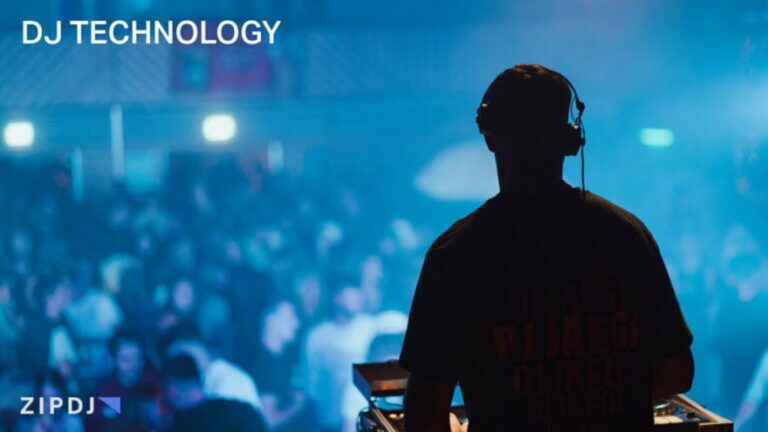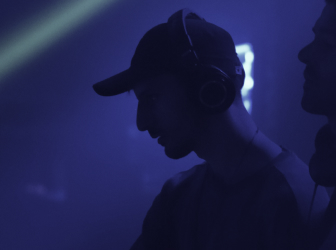DJ Technology: 10 Tools Redefining How DJs Play Live In 2025

The latest DJ technology is changing the way DJs perform their live sets, incorporating artificial intelligence in innovative new ways.
The advent of increasingly affordable controllers and lights further opens up opportunities for professional sets on a budget.
Read on, and we’ll show how this technical innovation is changing the world of DJing in radically new ways.

DJ Technology: 10 Tools Redefining How DJs Play Live In 2025
The latest technology has transformed how mixes are assembled, replacing the traditional decks and mixers with innovative new gear.
We’ve covered the evolution of both hardware and software and how developments in artificial intelligence are playing a role in DJing.
Now that we’ve established our criteria, let’s explore the tools redefining how DJs play live:
10. DJing With Spotify

Until recently, learning how to DJ with Spotify and create stunning sets has been marred by several platform limitations.
Their new feature looks set to radically change its prospects as one of the go-to platforms looking to use their playlists for DJing.
The AI DJ tool promises to help DJs to curate a personal selection of music with the addition of realistic spoken commentary.
Available for premium subscribers, it’s set to become an integral aspect of Spotify’s business model using the latest technology.
It’s constructed with OpenAI technology and Sonantic, the AI voice platform used for Val Kilmer’s voice in Top Gun: Maverick.
OpenAI will allow for a more refined, fine-tuned playlist creation with increased personalization, not unlike Discover Weekly.
When brought together, users can generate impressive mixes with AI-generated commentary for their sets.
It’s another promising step in the right direction for DJs who want to draw on extensive Spotify playlists to build their mixes.
9. Advanced Standalone Controllers
DJ controllers have been evolving ever since they entered the market, with each technical innovation opening up new DJing opportunities.
Standalone controllers – sometimes referred to as all-in-one DJ systems – combine software and hardware for a complete mixing experience.
New DJ tech is emerging that sees standalone controllers incorporating many more tools and features than seen before.
In addition to integrated CDJs alongside a DJ mixer, built-in speakers and even a selection of disco lights are now making their way into their designs.
This means DJ controllers will become capable of serving as a complete set-up for mobile and wedding DJs looking to lighten their load.
As streaming services become more DJ friendly full WiFi integration is a feature the latest DJ controllers are adding to their roster.
DJ controllers like the Denon DJ SC Live 4 feature TIDAL, SoundCloud Go+, Beatport Streaming, and Beatsource Streaming built in.
The inclusion of Amazon Music Unlimited into the mix means DJs can access an unprecedented amount of music in their sets.
As advanced standalone controllers become the norm, DJs can pack their headphones and take a complete DJ package to their gigs.
8. Affordable Pro-Level DJ Lights
Club DJs have long been accustomed to leaving the lighting display to the venue, so they can focus on putting together a set.
For wedding and mobile DJs, however, investing in lights for their gigs can be a painstaking and potentially costly process.
A new generation of affordable yet professional-level DJ lights is set to change the dynamic for DJs who need their own light shows.
This innovation includes the arrival of excellent quality moving headlights that won’t break the bank while delivering impressive results.
Such lights, which once cost thousands of dollars, are now available for a fraction of the price without compromising on quality.
Companies such as ADJ are manufacturing lightweight mobile light entertainment systems for visually-stunning DJ sets on a budget.
LED curtain lights and other LED-based light panels are also becoming widely available for under $200, opening up the potential for live shows.
With laser lights also rapidly dropping in price, creating visually stunning live DJ sets on a budget is becoming a reality.
7. Cloud-Based DJ Apps

Cloud-based DJing has evolved in leaps and bounds in recent years, with Beatport and Rekordbox leading the charge.
The ability to sync playlists across Serato, Virtual DJ, SoundCloud, and other platforms has been reshaping how DJs perform live.
At the same time, using DJ pools for promotion has changed the game for DJ producers who want to increase their online reach.
DJs can use these tools to get instant alerts about new releases and which tracks have received the most playtime.
Businesses such as Pioneer and Native Instruments are also stepping up and offering cloud-based DJing for mobile users.
Pioneer DJ’s introduction of an iOS version of Rekordbox reflects a growing trend for DJing on the move from smartphones and tablets.
Traktor Pro has included innovations that seamlessly allow DJs to move between their MP3 library and cloud-based archives.
While traditional vinyl records and turntables will continue to remain a niche DJing format, cloud-based DJing looks set to rise in popularity.
6. Immersive Online DJ Sets
Many DJs have turned to online resources to play their electronic music sets and define their style to remote audiences.
Some of the best TikTok DJs have had great success promoting their music and engaging with listeners in real time.
TikTok has taken steps to reinvent how DJs perform their sets on the platform with an immersive concert experience.
Partnering with DJ-producer Calvin Harris, the big tech giant is fully connecting audiences with a virtual universe.
Dubbed The Calvin Harris Experience, this virtual live show featured the star performing his set as a virtual avatar.
By using virtual reality headsets, attendees of the virtual concert could interact with Harris in a stunning virtual universe.
The event, which saw TikTok partnering with all-in-one VR headset manufacturer PICO, showcased how effective VR could be for performing DJs.
As this technical innovation becomes commercially available, the creative possibilities for visually stunning virtual concerts will expand.

5. Developments In DJ Streaming

When the first Boiler Room DJ set was performed online in 2010, it reshaped how DJs can use the internet for their live shows.
Since then, the live-streaming capabilities have become increasingly sophisticated and extended to warehouse parties and festivals.
The post-COVID landscape, which saw DJs of all kinds adapting to live streams, has continued to push innovation.
New controllers and other hardware that fully integrate live streaming into a DJ’s workflow are continuing to emerge.
Engine DJ Desktop 2.0 software paved the way with embedded software oriented towards a full live-streaming experience for online DJing.
This includes adding e-commerce features for monetization and allowing DJs to sell their merchandise directly to listeners.
This monetization strategy is being bolstered by VIP streaming options and integrated affiliate marking campaigns.
With the arrival of 5G, high-quality 4K video will further enhance the appeal of live streaming for DJs building their online presence.
Combined with 360-degree live streams that allow viewers to view the environment, it’s set to become a fully immersive experience.
4. Text-To-DJ Via AI
As DJ technology continues to develop, the definition of what a DJ does is set to evolve in tandem with new demands on the performer.
The advent of artificial intelligence means that DJs are no longer simply expected to find cue points on one track to mix into the next.
Instead, technology such as text-to-DJ AI is coming into play that handles these basic elements of DJing with simple voice commands.
Basic commands such as “play a Diplo track” can be combined with various modifications to change how DJs perform.
This could include commands such as “speed up the track and introduce a hip-hop beat” or “strip things back for a minimal version.”
As with AI-based tools such as ChatGPT, such commands and prompts will give DJs incredible versatility when creating new edits.
Such tools will also continue to blur the distinction between DJs and producers, creating unique remixes in seconds.
While this DJ tech is currently in the proof of concept stage, it won’t be long before they’re fully integrated into a DJ’s workflow.
3. Advanced Beatgridding AI
In addition to text-to-DJ tools, artificial intelligence’s role in music has paved the way for advanced beatmatching techniques.
While many DJs are happy beat-matching manually, using beat grids in DJ software opens up opportunities for advanced mixing skills.
With the beats locked in, DJs can focus on using effects and samplers and introducing auto loops and other features.
One of the shortcomings of these tools until recently is the issue of songs drifting out of sync when the BPM of a track fluctuates.
This is no longer a concern with AI-powered advanced beat gridding, delivering flexible and dynamic beat gridding for perfect results.
Genres that are typically difficult to beat grid, such as funk, soul, and rock, can now be effectively matched using artificial intelligence.
The result is an expansion in the scope of genres that can be featured in mixes without the headache of manually matching up BPM.
Whether you’re DJing live or hosting a podcast or radio show, advanced beat-gridding AI is paving the way for eclectic track selection.
2. Holographic Performances With HOLO
Holograms have been a feature of some of the best DJ visuals, although until recently, their application has been limited.
The advent of HOLO, the cutting-edge technology that projects ultra-realistic holograms into the air, is set to change the game.
EDM artist Eric Prydz first showcased the HOLO system at his live show at Ultra Music Festival in Miami with mind-blowing results.
The show, which combined holograms with state-of-the-art lighting, took the fusion of sound and light to new heights.
While previous hologram effects have been hit or miss, the HOLO system brings a level of solidity not seen before now.
A variety of shapes, patterns, and colors can be put together in an infinite possibility of combinations and synched to the audio.
Prydz’s set featured everything from Chinook helicopters and astronauts to cyborgs and a giant Beluga whale flying over the audience.
It’s an impressive evolution from older technology, such as the 3D mapping used by Amon Tobin on his ISAM tour in 2014.
1. Stems Open File Format
Traditional mixing has involved the blending of one track with another and the use of EQs and effects to bring additional texture.
The development of stems open file format systems, however, means that mixes can be put together that break down a track’s core elements.
These multi-channel audio files split a given track into its bass, drums, vocals, and melody, which can be mixed independently.
Having access to these additional elements radically improves the options artists have when mixing songs and creating live sets.
Some of the leading manufacturers of controllers, such as Native Instruments, are already integrating stems into their systems.
Since these are open-format files, they provide opportunities for live remixes and music production without paying licensing fees.
They also allow for more creative multi-deck mixes, blending vocals and other elements from a third track on the fly.
As DJing becomes increasingly tech-savvy, the future of DJing using stems will completely reshape the creative options available.
Summary
We hope you’ve found this guide to the current advances in DJ technology an eye-opening insight into the shape of things to come.
With artificial intelligence and virtual reality still in their infancy, the scope for new and innovative tools in development is huge.
Whether you’re DJing in clubs or working as a wedding or mobile DJ, these new and exciting tools will help you achieve the best results.
Stay ahead of the curve and sign up for ZIPDJ to gain access to the latest releases and remixes from the hottest producers.
Not a member ?
Join Today for Unlimited Music Downloads. Visit zipdj.com for more information.



